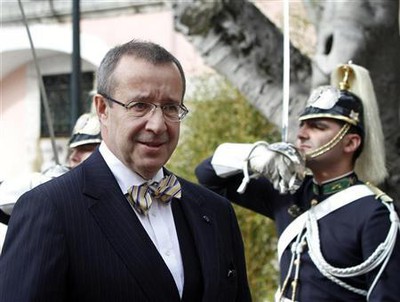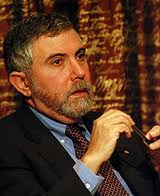Juni 9, 2012. Klart att presidenten blev förb...d!
Vem ska man tro på? Det kan verkligen vara svårt att bestämma sig vad man ska tro på ibland, eller väldigt ofta. Man får lyssna och tänka och bestämma sig. Men om en respekterad människa säger något, en människa som till och med fått Ekonomipriset i Nobels anda uttalar sig i en ekonomisk fråga, då måste man väl kunna lita på det.
Svaret är “NEJ”! Inte ens då. Han har uttalat sig om Europa och de ekonomiska problemen och hävdar att esterna gör helt fel. De har sparat sig ur krisen. Han menar att man ska stimulera ekonomin i kriser och alltså inte spara. Han kritiserade president Toomas Hendrik Ilves, som blev oerhört arg över påhoppet. Aktuaalne Kaamera har intervjuat andra ekonomer i USA. Finansministern Ligi har också svarat på angreppet och försäkrat att Estland absolut inte gjort fel, vilket också alla andra ekonomer håller med om. De säger: “Man måste skilja på stora länder och små länder.” Därefter intervjuades Krugman, och gissa vad han säger: “Jag vet egentligen ingenting om Estland.” Innan man tror på en fackman måste man alltså ta reda på hans bakomliggande kunskap i ämnet, eller...?
Svaret är “NEJ”! Inte ens då. Han har uttalat sig om Europa och de ekonomiska problemen och hävdar att esterna gör helt fel. De har sparat sig ur krisen. Han menar att man ska stimulera ekonomin i kriser och alltså inte spara. Han kritiserade president Toomas Hendrik Ilves, som blev oerhört arg över påhoppet. Aktuaalne Kaamera har intervjuat andra ekonomer i USA. Finansministern Ligi har också svarat på angreppet och försäkrat att Estland absolut inte gjort fel, vilket också alla andra ekonomer håller med om. De säger: “Man måste skilja på stora länder och små länder.” Därefter intervjuades Krugman, och gissa vad han säger: “Jag vet egentligen ingenting om Estland.” Innan man tror på en fackman måste man alltså ta reda på hans bakomliggande kunskap i ämnet, eller...?

Eller som presidenten säger i ett twitterinlägg:
"Let's write about something we know nothing about & be smug, overbearing & patronizing: after all, they're just wogs," President Toomas Hendrik Ilves said in a post on the social networking site early on Thursday.
"Let's sh*t on East Europeans: their English is bad, won't respond & actually do what they've agreed to & reelect govts that are responsible," he added later.
His office confirmed the tweets were from Ilves.
He was responding to a blog by Krugman on the New York Times website, which called the 2008-2009 output drop in Estonia a "depression-level slump", followed "by a still incomplete recovery". "Better than no recovery at all, obviously — but this is what passes for economic triumph?" Krugman wrote.
Ilves's office said in an emailed statement that the president's comments were "a sincere and immediate defense of the major and often difficult efforts of Estonia to deal with the economic crisis and to stick to the rules adopted in the European Union".
Ilves was born in Stockholm in 1953 after Estonia was occupied by the former Soviet Union and was raised in the United States. He has long been an eloquent and outspoken spokesman for his small nation, which joined the euro zone in 2011 and whose economy grew 4 percent in the first quarter of this year.
Estonia also has a tiny amount of sovereign debt, making it one of the fiscally soundest members of the indebted euro zone. (Reuters)
- Jag förstår honom så innerligt väl. Han är uppväxt i USA, men har återvänt till Estland och hittat ett land han vill försvara i alla lägen. Jag förstår honom och reagerar antagligen likadant om fel person kritiserar Estland!-
"Let's write about something we know nothing about & be smug, overbearing & patronizing: after all, they're just wogs," President Toomas Hendrik Ilves said in a post on the social networking site early on Thursday.
"Let's sh*t on East Europeans: their English is bad, won't respond & actually do what they've agreed to & reelect govts that are responsible," he added later.
His office confirmed the tweets were from Ilves.
He was responding to a blog by Krugman on the New York Times website, which called the 2008-2009 output drop in Estonia a "depression-level slump", followed "by a still incomplete recovery". "Better than no recovery at all, obviously — but this is what passes for economic triumph?" Krugman wrote.
Ilves's office said in an emailed statement that the president's comments were "a sincere and immediate defense of the major and often difficult efforts of Estonia to deal with the economic crisis and to stick to the rules adopted in the European Union".
Ilves was born in Stockholm in 1953 after Estonia was occupied by the former Soviet Union and was raised in the United States. He has long been an eloquent and outspoken spokesman for his small nation, which joined the euro zone in 2011 and whose economy grew 4 percent in the first quarter of this year.
Estonia also has a tiny amount of sovereign debt, making it one of the fiscally soundest members of the indebted euro zone. (Reuters)
- Jag förstår honom så innerligt väl. Han är uppväxt i USA, men har återvänt till Estland och hittat ett land han vill försvara i alla lägen. Jag förstår honom och reagerar antagligen likadant om fel person kritiserar Estland!-

På det svarar Krugman på sin blogg på New York Thimes:
Jörg Asmussen is Germany’s man at the ECB, which means that what he says matters. Here’s his speech in Riga earlier this week, asserting that the Baltic experience shows that austerity and internal devaluation actually do work. Notice that his evidence comes entirely from one year of fairly fast growth after an incredible decline. So it’s important to say that this proves very little.
Det är lite skoj att se hur de samtalar, de här gubbarna. De är förresten lika gamla.
Why the Baltics Matter.
Some readers have urged me not to spend time on Latvia, Estonia, etc., on the grounds that they are too small to matter. Sorry, but that’s not true. For one thing, every economy — even a small one — is potentially a “natural experiment” that teaches us more about how economies in general work. Beyond that, the Baltics now loom large in the imagination of austerity’s defenders, particularly since Ireland keeps refusing to play along and be a success story.Jörg Asmussen is Germany’s man at the ECB, which means that what he says matters. Here’s his speech in Riga earlier this week, asserting that the Baltic experience shows that austerity and internal devaluation actually do work. Notice that his evidence comes entirely from one year of fairly fast growth after an incredible decline. So it’s important to say that this proves very little.
Det är lite skoj att se hur de samtalar, de här gubbarna. De är förresten lika gamla.
Trackback

